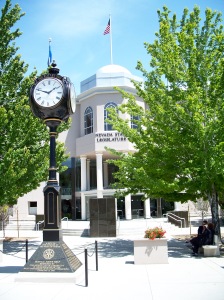As an advocate for the Open Meeting Law, I’m always going to argue the Nevada Legislature should be covered.
But …
The approach I’ve taken as lobbyist for the Nevada Press Association has been toward a compromise, which may surprise some people. Let me explain.
First, the Legislature does make its floor sessions and committee meetings open as required by the state Constitution. The Assembly and Senate adopt open-meeting rules at the beginning of each legislative session.
One exception in the Constitution allows the Legislature to close a meeting to consider misconduct or incompetence. We saw that happen in the rare instance of former Assemblyman Steven Brooks.
Otherwise, the Legislature has an exemption from the Open Meeting Law. (Fortunately, we were able to get rid of language in the statute that said ‘The Legislature is not a public body,’ which was a lawyerly way of excluding it. Obviously, the Legislature is a public body. Now the law says what it means: The Legislature is exempt.)
In practice, the Legislature is considerably more accessible than through most of Nevada’s 150-year history. We can thank technology (and the work of the Legislative Counsel Bureau) for that. Floor sessions and committee hearings are streamed live, bills and amendments are posted online promptly, and the NELIS system provides testimony and exhibits at the Legislature’s website.
If you want to testify, you can do it live in Carson City or, most of the time, at the Grant Sawyer Building in Las Vegas by video link. Sometimes, a video link is set up in Elko, too.
It wasn’t that long ago somebody wanting to testify — or even hear what was going on at a committee meeting — would have to make the drive from Elko or Ely or Las Vegas to Carson City. It took a real commitment to participate in the legislative process.
Still, crucial parts of the legislative process are either hidden from the public or, at the end of each session, rushed through with little transparency.
The secret part is caucus meetings. That’s where each party in each chamber gets its members together behind closed doors to hash out what bills or amendments are going to move forward and which aren’t. While there’s often a healthy debate at the open hearings, we can only imagine the horse-trading that goes on in closed caucus meetings.
And as the clock ticks down each session toward sine die, the whole building becomes a bee hive — where half the bees are trying to stop the other half from accomplishing anything. Amendments pop up like magic, and committee meetings might occur while the members stand in a hallway, with lobbyists and reporters craning in to listen.
Those two elements are the reasons I work toward some kind of compromise in getting the Legislature covered by the Open Meeting Law.
1) The 120-day limit on legislative sessions makes it practically impossible to adhere to the law’s requirements for three days notice of a meeting. It’s a trade-off: Nevadans (including me) like the 120-day clock and wouldn’t want it extended to satisfy meeting-notice requirements.
2) Legislators are not going to approve any change in the Open Meeting Law that would require their caucus meetings be made public. Even if they did, they would find a way to get around it.
So my suggestion is to create a section in the Open Meeting Law only for the Legislature.
At a minimum, the statute could require legislators to adopt open-meeting rules each session. (Although they do now by practice, there’s no requirement.)
Moving forward, the law could set some standards for notice of committee meetings. Is 12 hours in advance too much to ask? How about six hours?
Placing the Legislature under the Open Meeting Law need not be an all-or-nothing proposition.
 Nevada Press Association The best in Nevada journalism since 1924
Nevada Press Association The best in Nevada journalism since 1924
